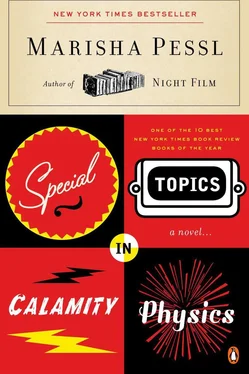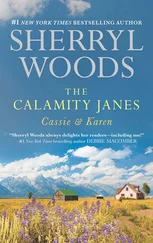“Jadey, where’s the cutter?” he asked, sniffing it.
She dragged on her cigarette and glared at him. “You said you’d be on time and you’re late. I’ll hate you until I die. Top drawer.”
He chuckled, a muffled sound, as if he were being smothered with a pillow, and I realized I wanted him to say something to me—“Glad you could join us,” “Hey, Bluuue ”—but he didn’t. He didn’t see me.
“Blue, how about a dirty martini?” Leulah asked.
“Or something else,” said Jade.
“A Shirley Temple,” suggested Nigel with a smirk.
“A cosmo?” asked Leulah.
“There’s milk in the fridge,” Nigel said, deadpan.
“A — a dirty martini would be quite nice. Thank you,” I said. “Three olives, please.” Three Olives, Please: it was what Eleanor Curd specified, the emerald-eyed heroine who caused men to shudder with hungry desire in A Return to Waterfalls (DeMurgh, 1990), pilfered from June Bug Rita Cleary’s gold leather purse when I was twelve. (“Where’s my book?” she repeated to Dad for days like a woman with mental illness who’d wandered away from her sanitarium. She searched our every couch, rug and closet, at times on her hands and knees, frantic to find out if Eleanor ended up with Sir Damien or they stayed apart because he believed she believed he believed he’d impregnated a vicious tattletale with an illegitimate child.)
As soon as Leulah handed me my martini, I was forgotten like Line 2 on a Corporate Headquarters Switchboard.
“So Hannah had a date tonight,” Nigel said.
“No, she didn’t,” said Charles, smiling, though he sat up imperceptibly as if he’d felt the prick of a needle in his seat cushion.
“She did,” said Nigel. “I saw her after school. She was wearing red.”
“Oh, boy,” said Jade, exhaling cigarette smoke.
They talked on and on about Hannah; Jade again said something about Goodwill and “bourgeois pigs,” words that startled me (I hadn’t heard the phrase since Dad and I, driving across Illinois, read Angus Hubbard’s Acid Trips: The Delusions of ’60s Counterculture [1989]) though I didn’t know who or what she was referring to, because I found it impossible to focus on the conversation; it was like that cruel little blurry line at the bottom of an eye chart. And I didn’t feel like myself. I was a swirl of Interstellar Material, a mist of Dark Matter, a case in point of General Relativity.
I stood up and tried to make my way to the door, but my legs felt as if they were being asked to measure the universe.
“Jesus,” said Jade from somewhere. “What’s wrong with her?”
The floor was transmitting in a wide array of wavelengths.
“What’d you give her to drink?” Milton asked.
“Nothing. A mudslinger.”
“ Told you to give her milk,” Nigel said.
“I gave her a martini,” added Leulah.
Suddenly I was on the floor, gazing at the stars.
“Is she going to die?” asked Jade.
“We should take her to the hospital,” Charles said.
“Or call Hannah,” said Lu.
“She’s fine. ” Milton was leaning over me. His tendriled black hair resembled squid. “Let her sleep it off.”
A tidal wave of nausea was starting to flood my stomach and there was nothing I could do to stop it. It was like the black seawater overtaking a crimson Titanic stateroom, as recounted in one of Dad’s favorite autobiographies of all time, the gripping eyewitness account Black in My Mind, Yellow in My Legs (1943) by Herbert J. D. Lascowitz, who finally, in his ninety-seventh year, came clean about his Machiavellian behavior aboard the legendary ocean liner, admitting he strangled an unidentified woman, stripped her body, donned her clothes in order to pretend he was a woman with child, thereby securing a choice spot for himself on one of two remaining lifeboats. I tried to roll over and stand, but the carpet and the couch swerved upward and then, as shocking as lightning striking inches from my shoes, I was sick: cartoonishly sick all over the table and the carpet and the paisley couch by the fireplace and Jade’s black leather Dior sandals, even on the coffee-table book, Thank God for the Telephoto Lens: Backyard Photos of the Stars (Miller, 2002). There were also small but identifiable splatters on the cuffs of Nigel’s pants.
They stared at me.
And this, I am ashamed to say, is where memory abruptly drops off (see Figure 12, “Continental Shelf Cliff,” Oceanic Terrain , Boss, 1977). I can recall only a few flimsy sentences (“What if her family presses charges?”), faces peering down at me as if I’d tumbled down a well.
Yet I don’t really need a memory here, because that Sunday at Hannah’s, when they were calling me Gag, Retch, Hurl and Olives, they each went to great lengths to give me their eyewitness account of what had happened. According to Leulah, I passed out on the South Lawn. Jade claimed I’d muttered a phrase in Spanish, something along the lines of “El perro que no camina, no encuentra hueso,” or “The dog that doesn’t walk, doesn’t find a bone,” and then my eyes rolled into the back of my head and she thought I’d died. Milton said I got “nekkid.” Nigel claimed I “partied like Tommy Lee during the Theater of Pain tour.” Charles rolled his eyes when hearing these versions, these “gross distortions of the truth.” He said I walked up to Jade and she and I began to make out in flawless reenactment of his favorite film, the cult masterpiece of French fetishist director Luc-Shallot de la Nuit, Les Salopes Vampires et Lesbiennes de Cherbourg (Petit Oiseau Prod., 1971).
“Guys spend whole lives wishing to see that kind of thing, so thank you, Retch. Thank you.”
“Sounds like you really enjoyed yourselves,” Hannah said with a smile, her eyes glistening as she sipped her wine. “Don’t tell me any more. It’s not fit for a teacher’s ears.”
I could never decide which version I believed.
It was after I had a nickname that everything changed.
Dad said my mother, the woman who “left people holding their breaths in awe when she entered a room,” always acted the same no matter who she talked to or where she was, and sometimes Dad couldn’t tell when she answered the phone, if she was talking to “her childhood best friend from New York or a telemarketer, because she was so thrilled to hear from both.” “‘Believe me, I’d be overjoyed to schedule a carpet cleaning — your product is obviously terrific — but I have to be honest, we don’t actually have any carpets.’ She could go on and on with apologies for hours,” Dad said.
And I let her down, because, I’ll admit, I did act differently now that I was friends with them, now that Milton, immediately following Morning Announcements, shouted “Retch!” and the entire courtyard of students looked ready to Stop, Drop and Roll. Not that overnight I morphed into a tyrannical foulmouthed girl who’d started out in Chorus and managed to claw her way to the Lead. But, strolling through first-floor Hanover with Jade Whitestone between third and fourth periods (“I’m bushed,” Jade would sigh, hitching her elbow around my neck the way Gene Kelly does to a lamppost in Singin’ in the Rain ) was an unforgivably paparazzi moment; I thought I understood, completely, what Hammond Brown, the actor in the 1928 Broadway hit Happy Streets (known throughout the Roaring Twenties simply as The Chin) meant when he said “a crowd’s eyes have a touch like silk” ( Ovation , 1952, p. 269).
And at the end of the school day, when Dad picked me up and we fought about something, like my “tinseled” hair or a new slightly edgier essay I’d written—“Tupac: Portrait of a Modern Romantic Poet,” on which I received a derisory B (“Your senior year of high school is not the time to suddenly become alternative, hip and cool.”) — afterward, it was strange; before my friendship with the Bluebloods, after an argument with Dad, when I retreated to my room I’d always felt like a smudge; I couldn’t perceive where I began and where I ended. But now, I felt as if I could still see myself, my outline — a thin, but perfectly respectable black line.
Читать дальше












